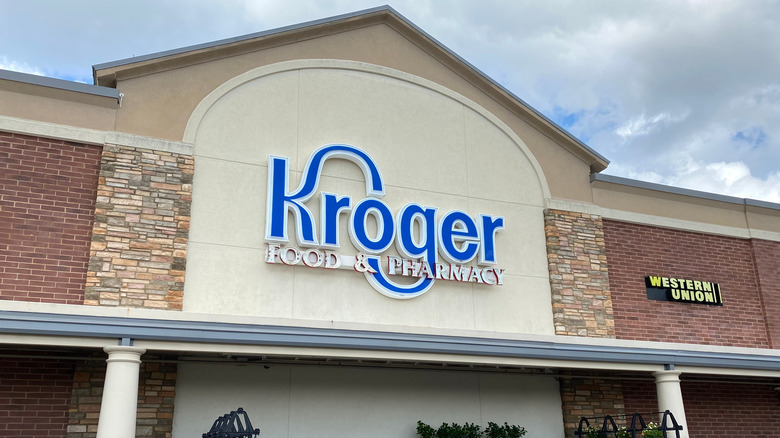Why The Potential Kroger-Albertsons Merger Is Receiving Pushback
The grocery industry was rocked on October 14 with news that Kroger and Albertsons, the two largest standalone supermarket chains in the U.S., are planning to merge as part of a $25 billion deal aimed at taking on big box competitors like Walmart (per Reuters). Albertsons owns more than 2,200 grocery stores under names including Albertsons, Safeway, Vons, Jewel-Osco, Shaw's, and Acme Markets, while Kroger controls 2,750 supermarkets through the Kroger, Dillons, Fred Meyer, Ralph's, and Food 4 Less umbrellas (via The New York Times). Together, CNN notes the two chains account for nearly 5,000 stores, 710,000 employees, and about $200 billion in sales from 85 million households.
While Albertsons and Kroger claim the merger will give them more market share and greater negotiating power with suppliers to get lower prices for shoppers, others — including Independent Vermont Senator and former Democratic Presidential candidate Bernie Sanders — have expressed concerns that the merger will put customers at the mercy of a corporate behemoth. Sanders called the plan "an absolute disaster" in a tweet, urging the Biden administration to reject the deal, while The New York Times reports that Utah Senator Mike Lee, the top Republican on the Senate antitrust committee, issued a statement promising to "protect consumers from anticompetitive mergers that could further exacerbate the financial strain we already feel in the grocery store checkout aisle."
Merger stokes inflation fears
The announcement of the merger comes weeks before the midterm election as both parties address concerns about inflation, which has been rising since the COVID-19 pandemic and has been exacerbated by Russia's war on Ukraine. NPR reported that inflation and abortion were the top two issues for American voters going into the midterms, with much of the concern about inflation stemming from food prices. According to The Hill, food costs are up 13% from October 2021 and have risen 0.7% in the past month alone. This jump has led many consumers, even those with higher income, to take cost-cutting measures, including eating out less and bargain shopping, either by choosing cheaper store brands or by moving to big box stores like Walmart, which has seen increases in their grocery sales even as other departments saw their sales dip (via CNBC).
Given the troubling state of the food market, it's not surprising that consumers are concerned that a merger will lead to exploitation from the new mega-corporation, especially when a 2008 study showed that 80% of similar mergers resulted in price hikes of 3 to 7% (per The New York Times). NYT notes it's possible the grocery merger will face a Federal Trade Commission challenge before it can be completed. Such challenges often result in mergers being denied or abandoned to avoid lengthy court battles, though it is unclear how the grocery chains would respond.

